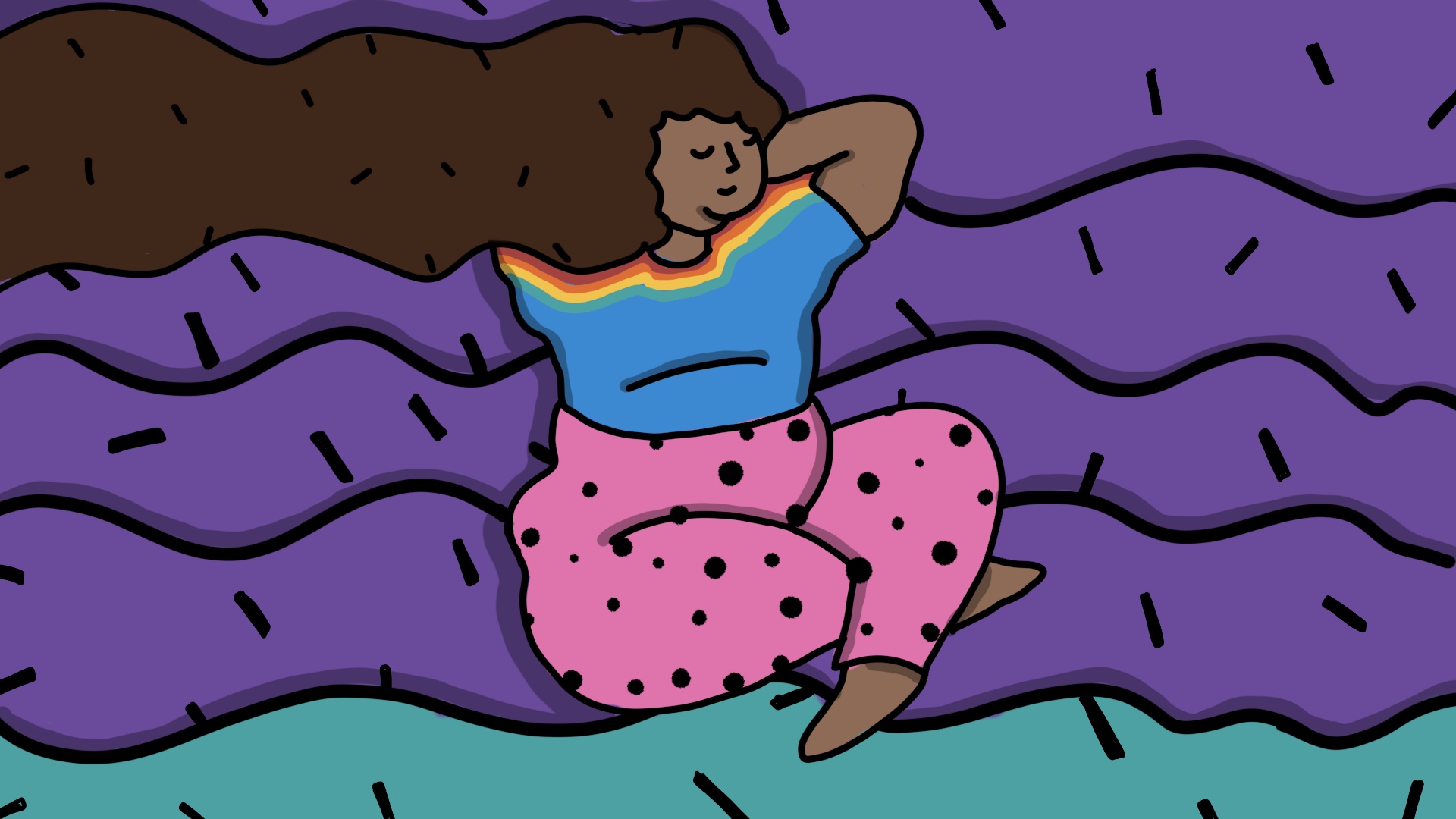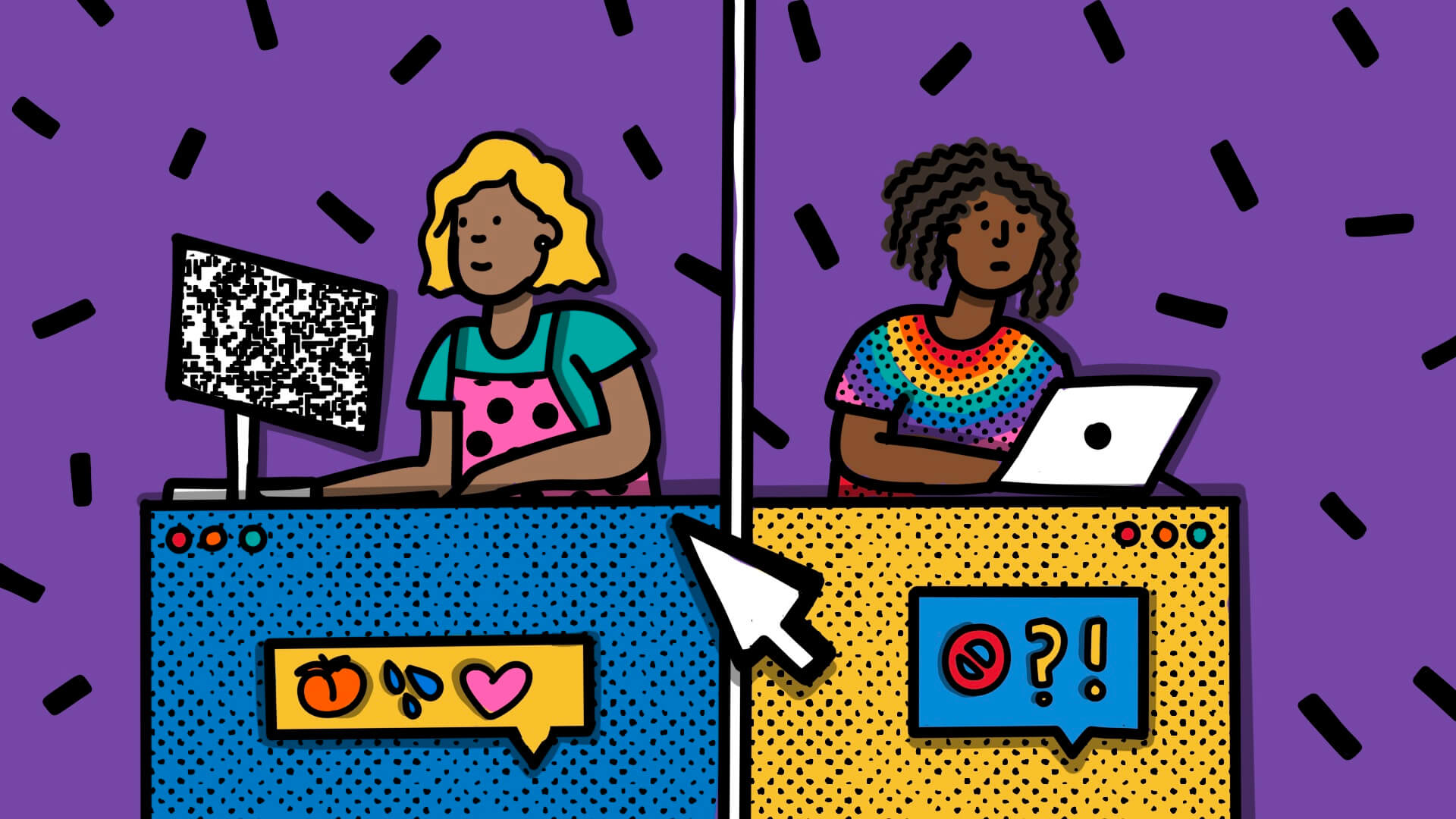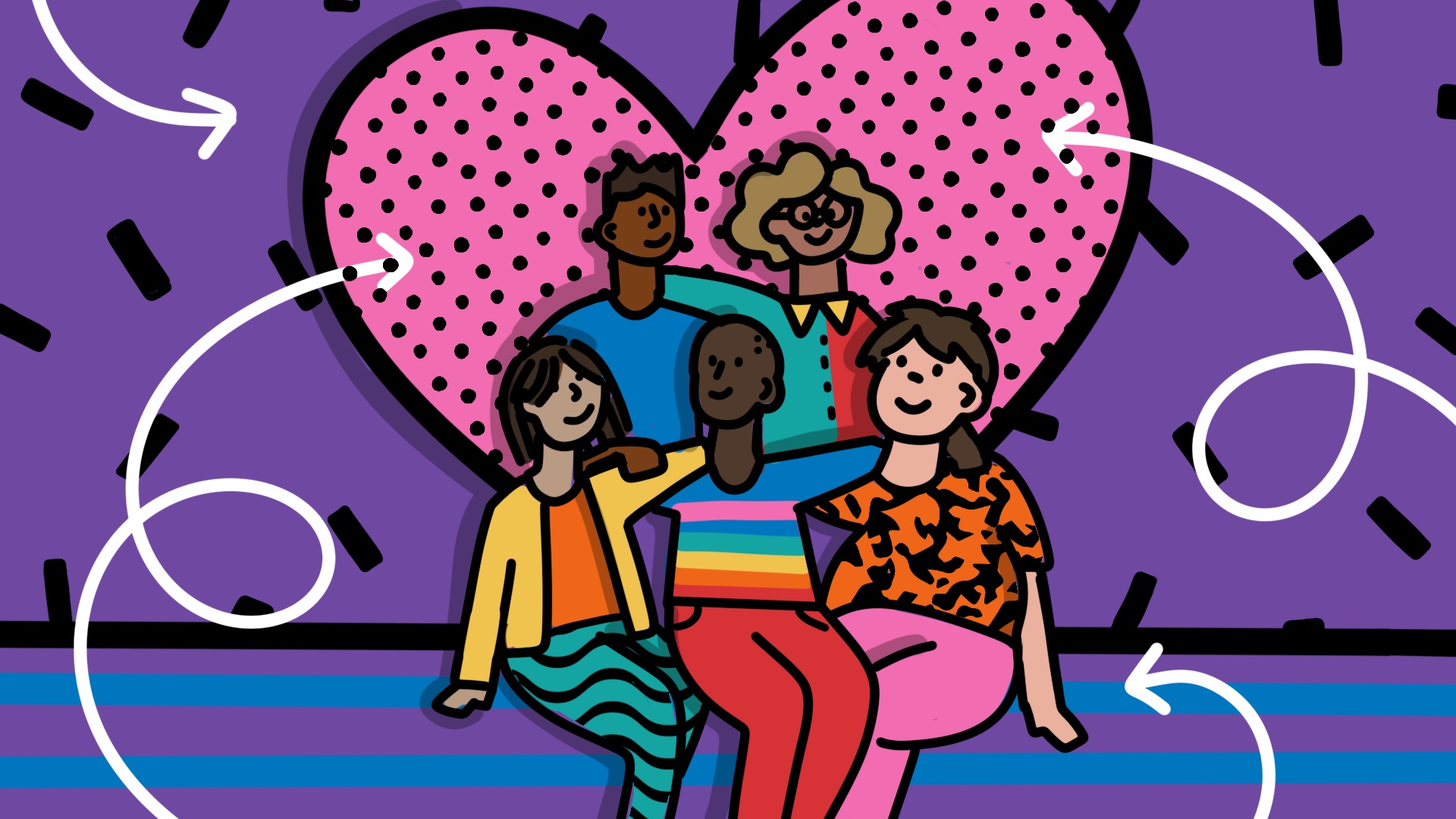
Illustration by Soofiya
Queeries: how do I work through my internalised fatphobia?
Remembering the white supremacist, colonialist and capitalist roots of fatphobia is a good place to start, says our Fagony Aunt. Have compassion for all that you’re holding.
Aisha Mirza
16 Jul 2021
Dear Fagony Aunt,
I am a Black queer woman and I wish I could blame this solely on the pandemic but the truth is I’ve been unhappy with my weight for a good few years now. However, lockdown life followed with this new anxiety about the world opening up again has amped it up to 100!
I’ve always been a comfort eater when depressed and I recently I bankrupt myself ordering takeout every day so I can stay in bed full, fat and frightened. Watching people on Instagram who have been working out all the way through lockdown makes me scared to waddle back into clubs.
How do I deal with all this hate I harbour for my own body and my internal monologue which seems to be very fatphobic?
Yours desperately, Jiggly Puff-Puff
Dearest Jiggly Puff-Puff,
About 10 years ago I was at this spoken word thing (I know, just bare with me) and the person on stage said some stuff I never forgot. It was about how where they’re from in Nigeria, clothes are made to fit bodies, unlike this devastating nation they had come to call home, where bodies are scrutinised, shamed and squeezed into conforming to an extremely basic and oppressive size spectrum and punished if they don’t. They shared memories of having fabrics draped and pinned, of communal care-taking and of pride in dressing their vessel.
Something about the violence of sizing and fashion became much clearer to me with this reframing, but it was only after experiencing the work of Black and brown thinkers, feelers and fat futurists that I started to understand the deeper links to white supremacy, colonialism and capitalism. Diet culture and fatphobia are tools of total mental and physical decimation that we learn to inflict on ourselves to keep ourselves small in every sense of the word.
“Diet culture and fatphobia are tools of total mental and physical decimation that we learn to inflict on ourselves to keep ourselves small in every sense of the word”
I am not Black or fat and I am certainly not a historian, so thank you for trusting me with this question and allowing me to share some things I’ve learnt. Perhaps reconnecting to the anti-Black roots of fatphobia might help you feel tethered to a story outside of yourself in that way oppressed people sometimes find solace in stories about us, even the bleak ones. Maybe by remembering this history you can begin to reassure yourself that this discomfort you feel around your body is in no way your fault and should not be yours to deal with alone. As always, take what feels useful and leave the rest.
Sizing as we have come to know it is a product of 18th century colonialism, which compared African and European bodies through the lens of the protestant ethic and decided that slenderness equated rationality, purity and self-control. Essentially, the colonisers needed to keep classifying and exacerbating aspects of racial identity in order to create clear differences between those who were enslaved people and those who were not.
“Having compassion for all that you’re holding is always a good first step”
This project was successful: while we know that body size does not correlate with health, that being fat does not mean you’re lazy and that ‘one-size’ often doesn’t fit all your goddamn limbs at once (let alone all people), these ideas about weight and worthlessness have been deeply internalised by all of us individually and are reflected absolutely everywhere structurally.
The Body Mass Index (BMI) is a universal formula to supposedly calculate how healthy someone is using their height and weight, but doesn’t account for differences in muscle and bone density and certainly does not consider differences in culture or how vulnerable communities are (not) resourced and cared for. This is just one type of racialised fat stigma that assumes that non-white bodies are inherently unhealthier and deserving of bad things, leading to worse health outcomes for people of colour: look at Black women, particularly fat Black women, not being believed when they attempt to seek medical care.
“Fatness, like mental health and criminality, is used to remove agency from people whose bodies do not look or act the ‘respectable’ way. It encourages people and the state to feel like they have a better idea of what that person should be doing with their body than the person inhabiting the body”
Fatness, like mental health and criminality, is used to remove agency from people whose bodies do not look or act the ‘respectable’ way. It encourages people and the state to feel like they have a better idea of what that person should be doing with their body than the person inhabiting the body. No!!! The truth is, food, nourishment and appetite are all very powerful and sexy, and finding ways to disrupt our relationships with them makes us easier to manipulate: think, every cult documentary you’ve ever seen.
Add to all of this the way that queer, gender non-conforming and depressed bodies are often demonised as undesirable and deviant, and the way that thinner people are largely uninterested in decentering themselves and learning more about this stuff and you have a lot that you’re dealing with, for literally just trying to exist in a body.
Having compassion for all that you’re holding is always a good first step. Congratulate yourself for noticing and naming, for writing these big feelings down, for being honest about your fears and your triggers and choosing to take a step towards them, even though that might feel uncomfortable and messy. Start from and come back to this place of compassion whenever you can – talk nice to yourself, give yourself so many breaks that you forget what it’s like to punish yourself.
***
It’s ok to dislike your body. It doesn’t make you any less woke or radical or feminist to have moments (and they are all moments, some of them are just really fucking long) of wishing for something different or feeling frustrated, uncomfortable, repulsed or detached from what you’ve got. You’re allowed to feel exactly how you feel about your body, it’s yours. Whitewashed and co-opted renditions of Body Positivity movements (started by fat black women) can put pressure on individuals to be in love with their bodies without making space for the white supremacist roots of fatphobia, the reality of chronic pain and trauma, or the other reasons this might be hard sometimes. This perspective can end up operating on the same carousel of shame as beauty facism and diet culture, relying on hyper individualistic capitalism to sort of magic yourself into feeling ok. Sometimes being positive isn’t realistic or honest or helpful, sometimes you just want to be. I guess the work here is finding out what that truly looks and feels like for you.
“You’re allowed to feel exactly how you feel about your body, it’s yours”
What would it be like to be supported in experiencing our bodies, not as never-quite-right or burdensome apologies but as our own soft fleshy houses that carry us upstream, always moving in one way or another, that have and always will be the only witness to all of our chaos?
if you only ever speak about fatness by discussing medical fatphobia, diet trauma, or desirability politics, you would be missing out on the warm plushiness of fat hugs, the huge splash we can make doing cannonballs in the pool, the deluxe beauty of plump rolls of cascading back fat, the way we somehow always have a little room for extra pie 😇😈, or the incredible way we become a heat source in the winter (or maybe that’s just me )
.
challenge yourself to write some ways fatness is a blessing. Imagine some ways a fat existence could be pure bliss (in the absence of fatphobia)
.
pepper in some neutral and positive uses of the word fat into your verbal diet
– talk about your cat’s fat belly in an adoring way
– mention how fat and ready your avocado is for eating
– imagine how happy those fat clouds are above your head
– Sonalee Rashatwar @thefatsextherapist
***
In terms of anxiety about going outside again, it makes so much sense that this would coincide with your feelings about your body, especially as we are stumbling out of a somewhat amazing period of not being perceived. Remember to take this at your own pace, and if it’s helpful, that so many people will be so consumed with their own anxieties and readjustment processes that attention may not be on you in the ways you fear. Until you’re ready to be out and about again, create a cocoon of love and support as best you can. Please mute anyone on socials who makes you feel weird about yourself (it doesn’t have to be forever, it doesn’t have to mean anything, and they never have to know) good luck to them but no thank you.
“Fat liberation isn’t always body positivity, it’s abolition”
Surround yourself with people who affirm you and meet your body with gentleness, joy and love. Create boundaries with anyone who talks about your or anyone else’s fatness. You don’t have to tolerate it. And try to go easy on yourself about ordering food. It has been such a ghastly hard time and you’ve been doing what you can to survive and eat food that you like and that brings you comfort which is honestly heroic. If it continues to be a problem financially, perhaps you can buddy up with a friend who also wants to cut down on spending and you can take turns cooking for each other and keeping each other accountable, or ordering together to split costs!
Think about building a more intentional community around fatness in your life. Curate your social media feed with happy, hungry, Black fat people, organise and go to fat clothes swaps, start a fat friends only group chat and immerse yourself in literature and art around fat futurism. This may seem counter-intuitive if it’s currently a site of pain for you, but perhaps you could build some more resilience and levity and make jokes and feel more resourced for the world if you were in closer contact with people who actually get it in a way that I or well-meaning thinner friends can’t. Fat liberation isn’t always body positivity, it’s abolition. It’s a better and hotter future and anyone who isn’t on board, like the rich, shall be eaten.
Resources for (un)learning:
- #veryfat #verybrave: The Fat Girl’s Guide to Being #brave and Not a Dejected, Melancholy, Down-In-The-Dumps Weeping Fat Girl in a Bikini by Nicole Byer
- Fearing The Black Body: The Racial Origins of Fat Phobia by Sabrina Strings
- Belly of the Beast: The Politics of Anti-Fatness as Anti-Blackness by Da’Shaun L. Harrison
- Heavy: An American Memoir by Kiese Laymon
- Hunger: A Memoir of (My) Body by Roxane Gay
- Happy Fat: Taking Up Space in a World That Wants to Shrink You by Sofie Hagen
- What We Don’t Talk About When We Talk About Fat by Aubrey Gordon
- Your Fat Friend by Aubrey Gordon
- The Body Is Not an Apology: The Power of Radical Self-Love By Sonya Renee Taylor
- Ask A Fat Girl column in Teen Vogue
- Ruby Tandoh’s food writing & latest cookbook Flavour: Eat What You Love
- Sonalee Rashatwar @thefatsextherapist
- Caleb Luna @chairbreaker
- Maintenance Phase podcast
- Shrill TV show
- The Underbelly: Yoga for everyone
- Kimya Dawson’s I Love Giants








